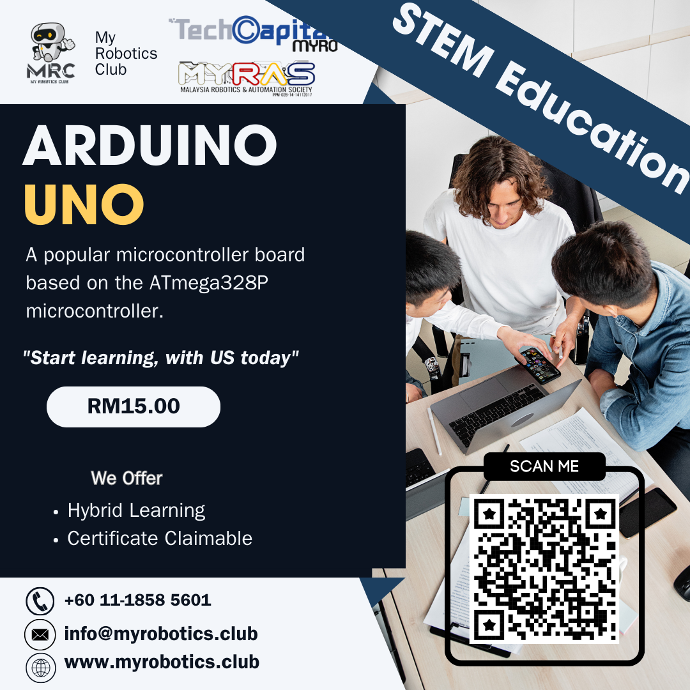
Arduino Uno
RM15.00
- Hybrid Learning
- Certificate Claimable
A popular microcontroller board based on the ATmega328P microcontroller. It's part of the Arduino family, known for being user-friendly and widely used in electronics projects, especially for beginners and hobbyists.
What you will learn
Foundations in Arduino Uno
Intermediate Arduino Uno
Advanced Arduino Uno
Advanced Applications with Arduino Uno
Capstone Projects with Arduino Uno
Course Content
Foundations in Arduino Uno
Semester 1:
- Week 1-2: Introduction to Arduino Uno hardware and IDE.
- Week 3-5: Basic electronics (resistors, LEDs, buttons).
- Week 6-8: Basic programming concepts (variables, loops).
- Week 9-12: Hands-on projects (e.g., LED blinking, button control).
- Week 13-15: Introduction to sensors (temperature sensor).
Semester 2:
- Week 1-3: Simple actuators (servos, motors).
- Week 4-6: Basic communication protocols (serial).
- Week 7-10: Mini project: Build a temperature-controlled fan.
- Week 11-15: Introduction to Arduino libraries (LCD display).
Intermediate Arduino Uno
Semester 1:
- Week 1-3: Advanced sensors (ultrasonic, IR).
- Week 4-6: Introduction to motor control (DC motors, PWM).
- Week 7-10: Intermediate projects (e.g., simple robot with motor control).
- Week 11-15: Advanced communication (I2C, SPI).
Semester 2:
- Week 1-3: Working with displays (OLED, 7-segment).
- Week 4-6: Wireless communication (Bluetooth, RF).
- Week 7-10: Mini project: Remote-controlled car.
- Week 11-15: Introduction to Arduino shields (Wi-Fi, Ethernet).
Advanced Arduino Uno
Semester 1:
- Week 1-3: Data logging with Arduino (SD card, EEPROM).
- Week 4-6: Integration with mobile apps (using Bluetooth).
- Week 7-10: Advanced motor control (servo, stepper motors).
- Week 11-15: Project: Build a robotic arm.
Semester 2:
- Week 1-3: Advanced sensors and integration (GPS, gyroscope).
- Week 4-6: Internet of Things (IoT) basics with Arduino.
- Week 7-10: Project: IoT-enabled weather station.
- Week 11-15: Capstone project: Design and build a complex Arduino-based system.
Advanced Applications with Arduino Uno
Semester 1:
- Week 1-3: Advanced motor control (stepper motors, H-bridge circuits).
- Week 4-6: Building custom Arduino shields.
- Week 7-10: Robotics applications with Arduino (autonomous robots, drone control basics).
- Week 11-15: Project: Build a self-balancing robot.
Semester 2:
- Week 1-3: Integration of multiple sensors and actuators.
- Week 4-6: Arduino in wearable technology (e.g., fitness trackers).
- Week 7-10: Introduction to low-power applications and energy harvesting.
- Week 11-15: Capstone project: Design a complex, energy-efficient system using Arduino.
Capstone Projects with Arduino Uno
Semester 1:
- Week 1-3: Ideation and proposal for a final year project.
- Week 4-6: Research and feasibility analysis.
- Week 7-9: Prototyping and testing of individual components.
- Week 10-12: Integration of components into a cohesive system.
- Week 13-15: Final project iteration and testing.
Semester 2:
- Week 1-3: Final integration and system testing.
- Week 4-6: Project documentation and report writing.
- Week 7-9: Final project presentation and demonstration.
- Week 10-12: Reflection on learning outcomes and future applications.
- Week 13-15: Preparing for potential competitions or exhibitions.
Click "Enroll Now" for an easy registration.
Learn more, gain more.